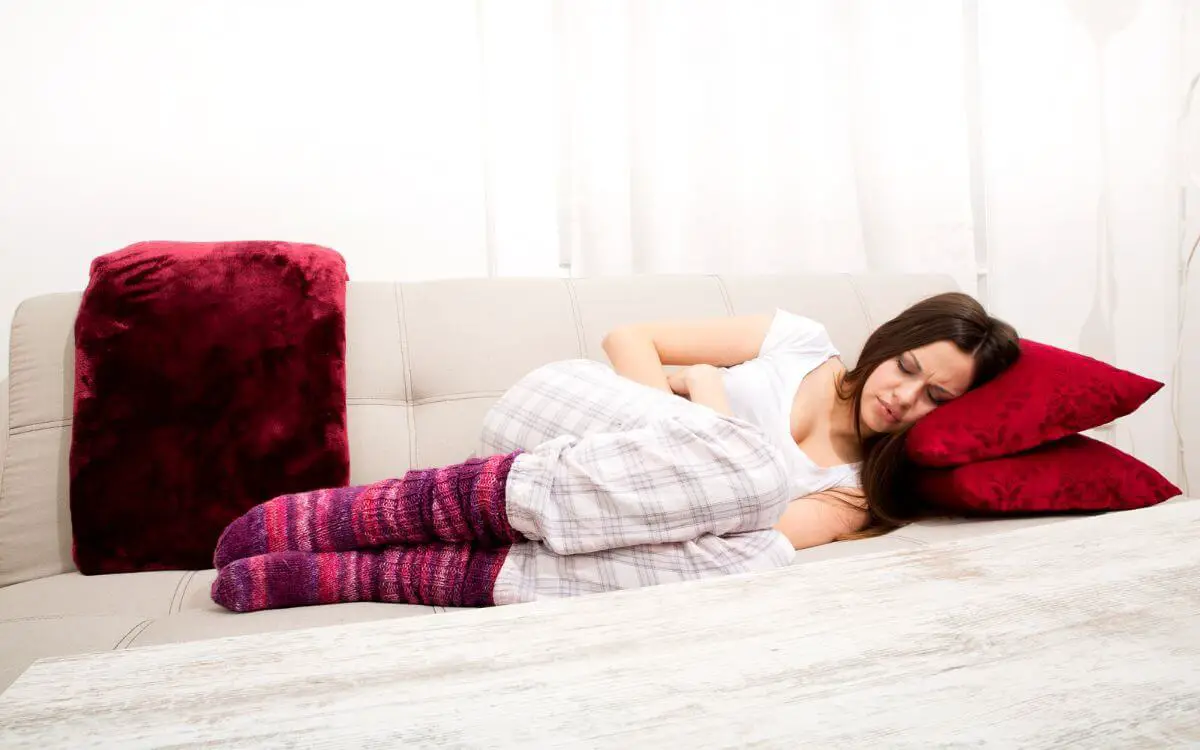Why my wife has stabbing pain when pooping during a period?
Stabbing pain during bowel movements during menstruation may be due to dysmenorrhea, endometriosis, pelvic inflammatory disease, uterine fibroids, or IBS. Hormonal changes, inflammation, and cramping can also cause constipation contributing to pain and discomfort.
Period pain is a common symptom that many women experience, and it can range from mild to severe. There are many causes of it, however, when women experience sharp pain when peeing or pooping during a period, or back pain during the menstrual cycle, one chronic condition called endometriosis comes to mind.
Many women (including my wife), experience dysfunction in pelvic floor muscles, overall pain in the pelvic region, and painful sex because of endometriosis. Endometriosis is a chronic condition in which tissue that is similar to one that normally lines the inside of the uterus grows outside of the uterus.
Endometriosis may cause many severe symptoms such as period cramps, cramping with ovulation, and pain during intercourse.
- 5 common reasons for stabbing pain when pooping during period.
- Women's health.
- Pelvic pain.
- Primary dysmenorrhoea.
- My wife's endometriosis.
- Endometriosis in other areas.
- Adenomyosis.
- The diagnosis.
- The treatment.
- What to do if your wife is always sick?
- A final word on stabbing pain when pooping during a period.
- Frequently asked questions.
5 common reasons for stabbing pain when pooping during period.
Stabbing pain when pooping during period is a common issue among menstruating women. This type of pain is usually caused by hormonal changes that occur during a period, leading to muscle contractions in the uterus and rectum. These contractions can cause a sharp, stabbing pain that is often worse when passing stools. The pain may also be accompanied by other period-related symptoms, such as cramping, bloating, and fatigue.
There are several possible causes of stabbing pain when pooping during a period. One common cause is endometriosis, a condition that is close to my heart as my wife suffers from it. She has stage 4 deep infiltrating endometriosis. Endometriosis occurs when a tissue that is similar to one that normally lines the inside of the uterus grows outside of it. This can cause painful periods and pain during sex, as well as pain during bowel movements.
Another possible cause is pelvic inflammatory disease, an infection of the reproductive organs that can cause pain during sex, heavy periods, and pain during bowel movements. But there is more to it, and below, I listed 5 common reasons for stabbing pain when pooping during the period.
If you are experiencing stabbing pain when pooping during your period, it is important to see a healthcare provider to determine the underlying cause of your symptoms.
Your doctor may recommend over-the-counter pain relievers, such as ibuprofen or acetaminophen, to help manage your pain. They may also recommend lifestyle changes, such as exercise or dietary changes, to help alleviate your symptoms.
Taking about common reasons for stabbing pain when pooping during a period, here are five of them:
- Proctalgia Fugax – a sudden, intense pain in the rectum that is unrelated to menstrual periods, but can be triggered by bowel movements.
- Endometriosis – a condition where the tissue that is similar to the one that lines the inside of the uterus grows outside of it, causing painful periods and pain during sex, as well as pain during bowel movements.
- Pelvic inflammatory disease – an infection of the reproductive organs that can cause pain during sex, heavy periods, and pain during bowel movements.
- Dysmenorrhea – painful menstrual periods that can be caused by hormonal imbalances or other underlying conditions.
- IBS – Irritable Bowel Syndrome (IBS) can cause abdominal pain, bloating, and changes in bowel movements, which may be worse during a period.
Women’s health.
Women’s health encompasses a vast range of topics, including painful periods with endometriosis. It is important to remember that period pain can affect women in different ways, so it is important to pay attention to the signs and symptoms that you or your wife may experience.
Although for many women isn’t, if left untreated, endometriosis can be a life-threatening condition. If someone has stabbing pain when pooping during a period it could also mean cancer, so be aware of that.
When many women see a doctor, if he is male, you may find that your wife’s symptoms such as stabbing pains in the pelvic area along with other severe symptoms such as heavy bleeding, or even cysts on the ovaries may be ignored.
Pelvic pain.
Pelvic pain may be caused by endometriosis, but it can also be caused by fibromyalgia disorder, which my wife also suffers from.
Pelvic pain caused by fibromyalgia is usually sharp and localized, while endometriosis pain can be felt throughout the pelvis or abdomen. Endometriosis pain is often described as a dull ache and worse with pain caused by period cramps.
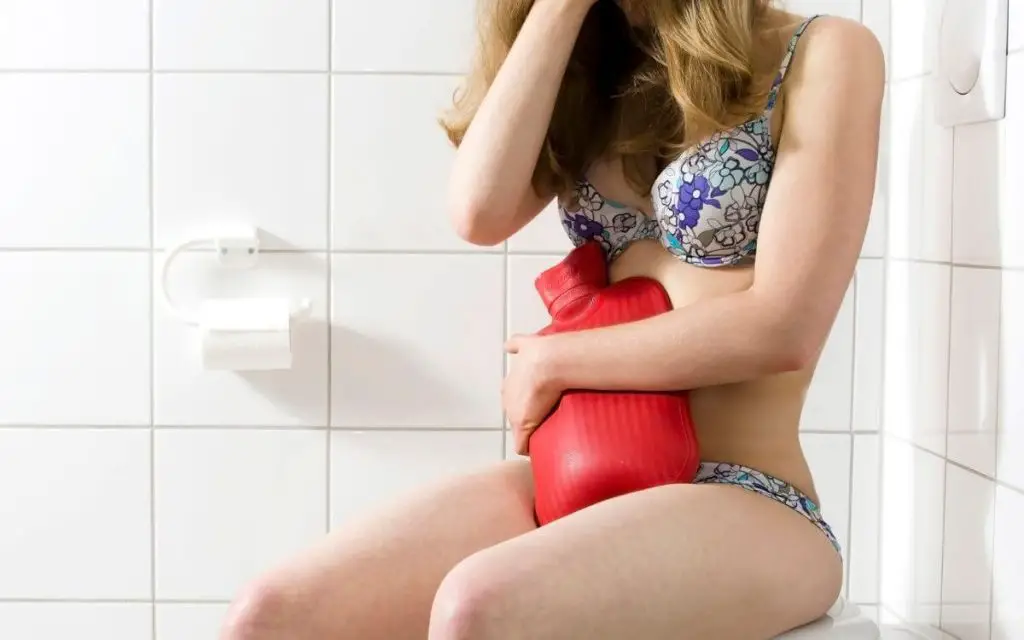
Primary dysmenorrhoea.
Women’s health isn’t taken seriously. Many women complain about severe pain during their menstrual cycle but doctors think that such severe symptoms are simply common symptoms of primary dysmenorrhoea.
They think that periods suppose to be painful and that women overreact. The truth is that primary dysmenorrhoea, period cramping, and other period-related issues can be debilitating.
My wife’s endometriosis.
My wife has been diagnosed with stage 4 endometriosis. The severity of her deep infiltrating type of endo made her symptoms extremely debilitating.
Her period lasted longer and caused her to experience severe stabbing pain when passing bowel movements, constipation, Irritable Bowel Syndrome, sharp pain when peeing, and back pain during her menstrual cycle.
Stage 4 endometriosis can be a lot more complicated to treat than mild cases of endo, so it’s important for my wife (and many women with endometriosis) to seek the help of a qualified health professional who can assess their individual case and offer the right kind of treatment.
My wife also has endometriosis tissue on her bladder and her bowel. Let’s explore that a little in a minute. Firstly, if you want to learn more about endometriosis, I wrote an “Endo-Tool, Endometriosis for Men” e-Book.
You can get the 1st Chapter of the e-Book for FREE! The first chapter alone contains all the comprehensive medical knowledge about endometriosis, including:
- What is endometriosis?
- What are the symptoms?
- What causes endometriosis?
- What does endometriosis look like?
- What are the stages?
- What are the types?
- What is adenomyosis and how is it related to endometriosis?
- Why do some women develop severe endo and others don’t?
- Does endometriosis cause infertility?
- How is endometriosis diagnosed?
- Do types and stages affect the treatment?
- Recurrence of endometriosis after excision surgery.
FREE Chapter of “Endo-Tool”
Endometriosis e-Book for Men
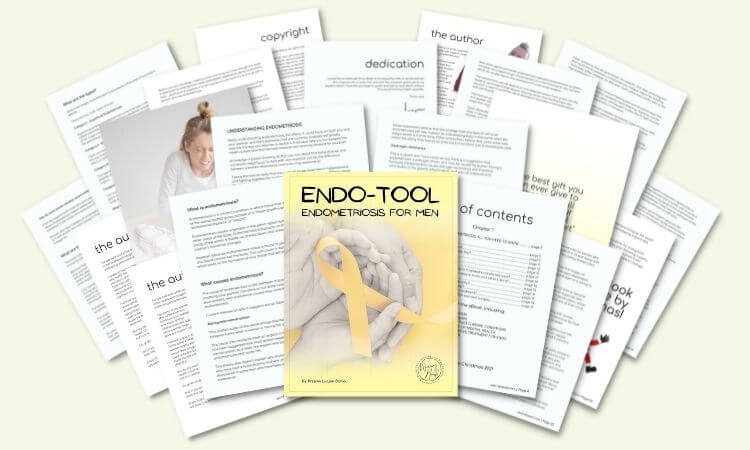
Bladder endometriosis.
Endometriosis tissue on the bladder can cause pain with periods and the need to pee frequently. It is also associated with an increased risk of bladder infections, blood in the urine, difficulty urinating, back pain, and other symptoms like period pain.
Treatment for this type of endometriosis typically includes medications such as hormonal treatments or nonsteroidal anti-inflammatory drugs (NSAIDs) to reduce pain with periods and inflammation.
Surgery may be necessary to remove the endometriosis tissue from the bladder wall and help manage the symptoms which often include pelvic pain, bladder pain, urinary tract infection, difficulty urinating foul-smelling urine, or pain in the belly button area.
Bowel endometriosis.
Endometriosis affects the bowel in 3%-37% of all women and the endometrial tissue on their bowel might be causing pain during a bowel movement, rectal pain, discomfort, pressure when pooping rectal bleeding, and diarrhea or constipation. It is also associated with an increased risk of developing small bowel obstruction or bowel perforation.
These symptoms vary from those of bladder endometriosis.
Treatment for endometriosis in the bowel depends on the severity of the endometrial tissue but may also include medical treatment and surgery.
Endometriosis in other areas.
Apart from rectal pain, depending on the stage and type, endometriosis symptoms can be felt outside the pelvic region.
Other areas of the body affected by endometriosis lesions may include the ovaries, and fallopian tubes, but also the pudendal nerve, pelvic floor muscles, lungs (which can cause difficulty breathing), eyes, and brain.
It can cause other symptoms like muscle spasms, abdominal pain, primary dysmenorrhea, anxiety-related heart palpitations, heavy bleeding, and when it comes to pain with periods – short painful periods and long painful periods, and periods cycles that have different lengths.
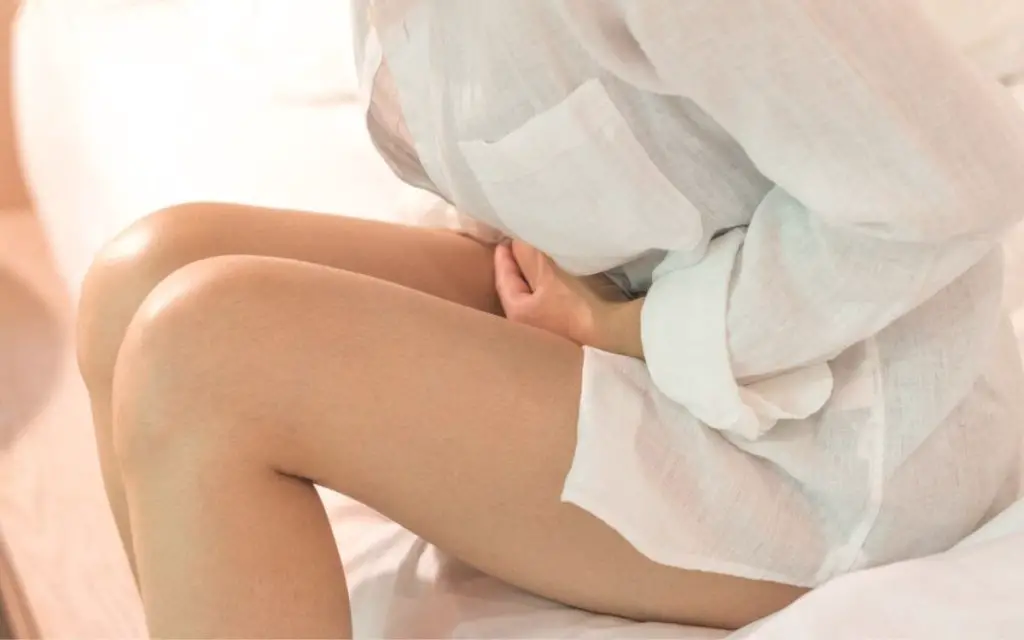
Adenomyosis.
Adenomyosis differs from endometriosis in that it affects the uterus rather than the other organs even though it is also accompanied by cramps, and heavy period bleeding. The uterus affected by adenomyosis may be enlarged, and pain with periods can last throughout the period.
Many people wrongly think that adenomyosis is endometriosis in the uterus, it is a separate condition.
The diagnosis.
When it comes to women’s health and endo, the formal diagnosis can be long and complicated. To diagnose endometriosis, a doctor will likely perform a physical exam, ask questions about pain during periods, may offer imaging tests, and should order laparoscopy (a minimally invasive surgical procedure).
If your wife is experiencing period pain that does not respond to over-the-counter medication, cramping with ovulation, constipation, stabbing pain when pooping during a period, rectal pain, and discomfort with intercourse, she should see her doctor for an evaluation.
Cramping is normal, but it’s important to remember that painful periods are common and usually not a sign of anything serious, but if your wife’s chronic pain persists or worsens over time, it isn’t normal and it may be worth talking to her doctor about endometriosis symptoms and potential treatments.
The treatment.
Treatment options for endometriosis include hormone therapy, surgery to remove the endometriosis tissue, or a combination of both. Your doctor will work with you and your wife to develop a personalized treatment plan to help reduce her period pain.
Apart from medication that can help when all of your wife’s muscles in her pelvis hurt, she should think of a holistic approach to treatment such as using a heating pad on the painful lower abdomen area of the body to relieve symptoms.
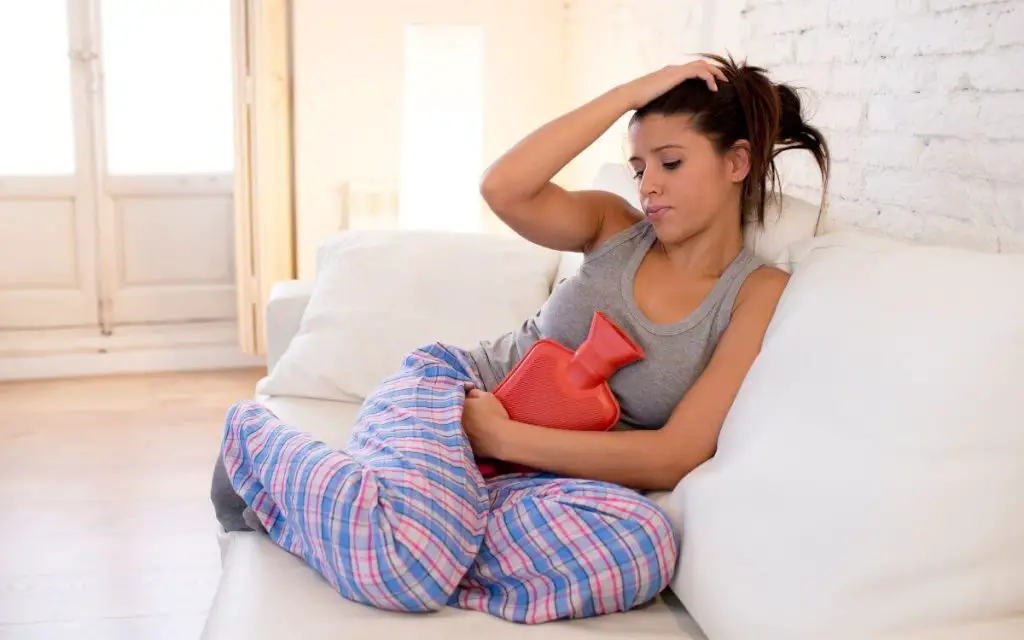
What to do if your wife is always sick?
Endometriosis is unforgiving and it seems like your wife is always sick, not only when she has stabbing pain when pooping during a period. My advice for you would be as follows…
When your wife is always sick, you should first and foremost listen to her and pay attention to her needs. Ask her how she feels, show compassion, and do household chores such as grocery shopping or cooking together.
Reach out to her doctor or specialist (OB-GYN) and ask what kind of treatment is available for endometriosis.
Don’t forget to take care of your own needs. Women’s health is important, but you also have to practice self-care because you are not only the caregiver, but you are also the partner. Find ways to manage stress and make sure to get enough rest. Taking part in activities that help relax your body and mind can also be beneficial.
This applies to both of you. Self-care is important!
Finally, don’t forget to seek emotional support. Talk openly with friends, family members, and peers about your experiences. Both of you can also consider joining endometriosis support groups or a mentor program to stay connected with people who understand first-hand what you and your wife are dealing with.
Taking care of someone with endometriosis can be hard, but suffering from endometriosis is even worse. With the right approach and support, you can both manage it. No matter how difficult the situation may seem, remember that endometriosis is a chronic condition that can be managed and even treated.
You and your wife can overcome period pain together!
A final word on stabbing pain when pooping during a period.
Be there for your wife when she suffers from terrible flare-ups of symptoms. Accompany her to see a doctor and confirm that she does experience pain, dysfunction with pelvic floor muscles, stabbing pains in her pelvis, and heavy bleeding.
Discuss the treatment options, whether she needs laparoscopy or hysterectomy (cutting out of the uterus). It needs to be discussed beforehand in case both of you want to conceive or not.
Apart from common treatments like typical pain relievers, discuss with your wife what treatment you can do at home, to help her with bowel movements, peeing, or other symptoms.
Remember that endometriosis will affect both of you, so to find a way to navigate through the new normal, you need to be a team.
My marriage survived over a decade and knowing that the endometriosis divorce rate is 75% high, I feel extremely lucky that our marriage survived the challenges that this diabolic chronic condition brings.
Our marriage went through ups and downs. My wife tried to commit suicide on two occasions, she also asked me on many occasions to divorce her thinking that I wasn’t happy and that I would be happier with another woman.
I swore to love her in illness and in health. I never broke that promise.
Both of you should be there for one another. Just because your wife has endometriosis doesn’t mean she cannot contribute to your relationship. She is still a fairly independent woman, she is worth loving and wants to be happy. Women’s health matter to me, and it should to you too.
Help her the best way you can. Good luck!
Frequently asked questions.


About Me
Hi, I’m Lucjan! The reason why I decided to create this blog was my beautiful wife, who experienced a lot of pain in life, but also the lack of information about endometriosis and fibromyalgia for men…
